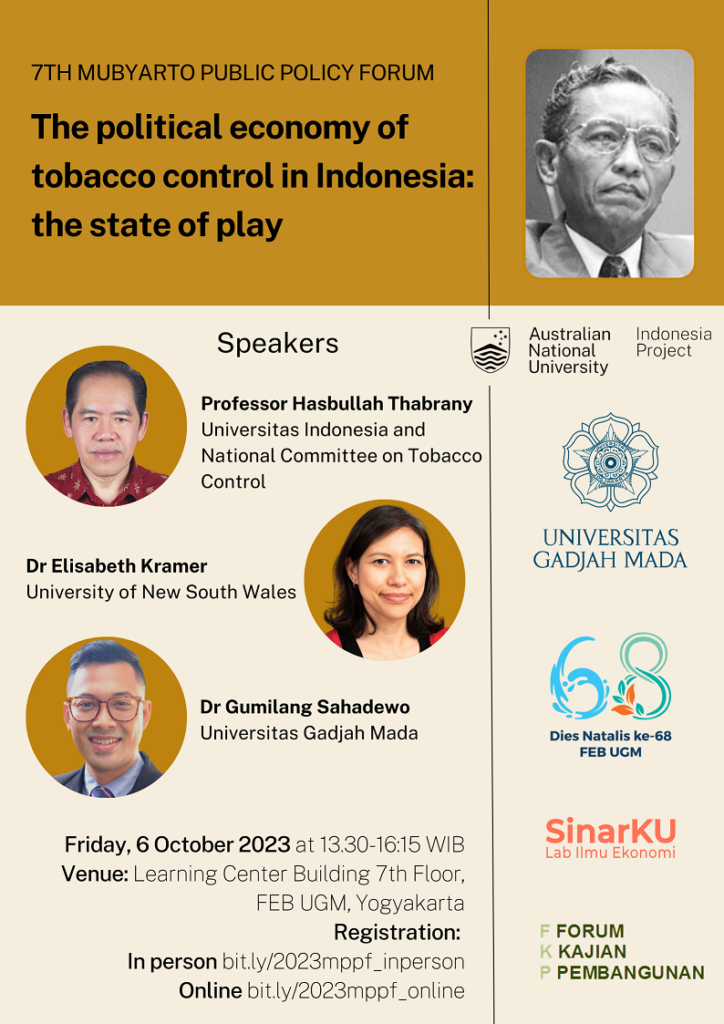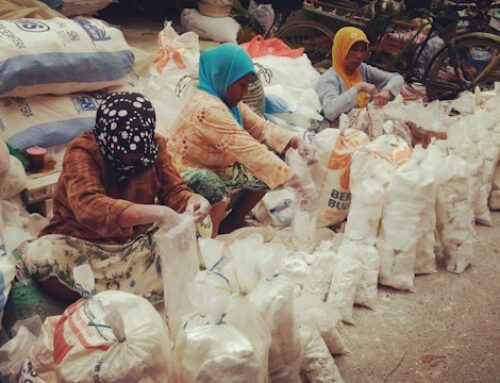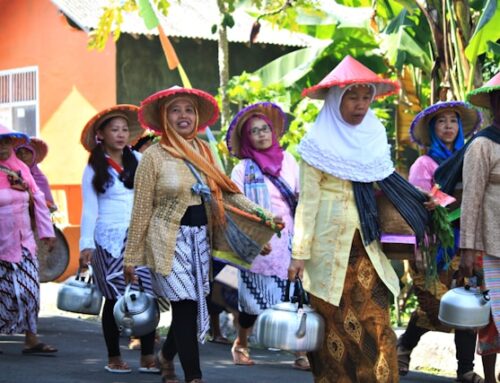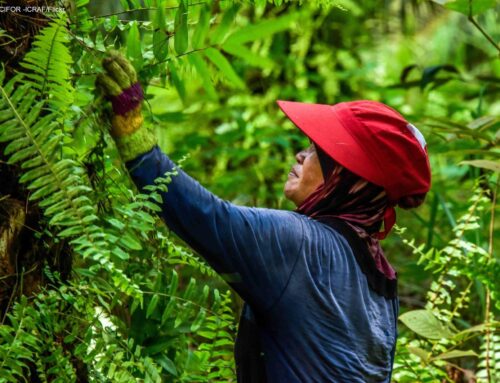In the last quarter of century, following the Asian Financial Crisis and the post-New Order political change, Indonesia has seen a series of policy reforms to address the challenges in the health sector. The nation faces existing challenges shaped by years of under-investment in the health sector and new challenges that come along with the health and epidemiological transitions Indonesia is experiencing. While some of the reforms, including the introduction of the universal health care, have met considerable success, other that were aimed to address long-standing issues in the sector stalled.
One area in which policy reforms has met limited success is in tobacco control, an area where the relevant policies extend much beyond the health sector, encompassing economic issues including taxes and employment, and involving a multitude of interests and actors. The policy forum will discuss where Indonesia currently stand on this complex issue and the challenges of moving through with reforms.
TIME AND VENUE
Friday 6 October 2023 at 13.30-16.15 WIB (please arrive by 13.15WIB as we will start promptly at 13.30WIB)
Seminar Hall, 8th Floor of Learning Center Building
Fakutas Ekonomika dan Bisnis Universitas Gadjah Mada
Jl Sosio Humaniora, Bulaksumur, Yogyakarta
Participate in person bit.ly/2023mppf_inperson (space limited) or online bit.ly/2023mppf_online
TOPICS AND SPEAKERS
- The paradoxes of tobacco control in Indonesia by Professor Hasbullah Thabrany (Universitas Indonesia and National Committee on Tobacco Control/KOMNAS Pengendalian Tembakau)
- Policy-making complexities in tobacco control by Dr Elisabeth Kramer (University of New South Wales)
- Evidence on the livelihoods of workers in the tobacco sector to support tobacco control policymaking by Dr Gumilang Aryo Sahadewo (Universitas Gadjah Mada)
*Abstracts are available below
PROGRAM
13:30 – 13:50 Opening and remarks
13:50 – 15:30 Mubyarto Panel on The political economy of tobacco control in Indonesia: the state of play with Professor Hasbullah Thabrany, Dr Elisabeth Kramer and Dr Gumilang Sahadewo, chaired by Dr Firman Witoelar (ANU)
15:30 – 16:10 Q & A session
16:10 – 16:15 Close
ABOUT THE SPEAKERS AND THE FOCUS OF THEIR TALK
Hasbullah Thabrany is Professor of Public Health at Universitas Indonesia. He is the Chairperson of the Indonesia National Committee on Tobacco Control (KOMNAS Tembakau) and the Indonesia Health Economics Association. Professor Thabrany was a key member in the design of the Indonesia National Health Insurance (JKN). He received his Doctor of Public Health degree from the University of California at Berkeley, USA. In this seminar, Professor Thabrany will discuss the paradoxes of tobacco control in Indonesia.
The complexity of tobacco control in Indonesia is further complicated by the large financial issues involving few large industries and mistakenly “farmers and labor forces”. Political economy of tobacco control may be easily twisted toward benefiting the those who have stronger financial incentives. The high information asymmetry of the long-term risks and benefits created various paradoxes that create the poor and the low-income become the end victims. The lack of awareness and understanding of future losses of high cigarette consumption by many of current political leaders who have control over tobacco control policy may put future politicians in the very large risks. Policy stakeholders have their own political interests, both in the executive and legislative branches, making current tobacco control policy decisions more of a political rather than evidence public policy. In this presentation, I would like to depict the paradoxes of tobacco control in Indonesia, the challenges faced in tobacco control efforts, which are intertwined with political interests that may be more inclined to the voice of tobacco industries as contrast to benefited the public at large. It is expected that academicians and public policy experts could play more roles in the future.
Elisabeth Kramer is a Senior Lecturer in the School of Social Sciences, University of New South Wales, Australia. She is a Scientia Fellow and a 2023 recipient of the prestigious Australian Research Council Discovery Early Career Researcher Awards (ARC DECRA) for her research on the politics of tobacco policy in Indonesia. Elisabeth completed a PhD in Indonesian Studies at the University of Sydney, Australia. Lis will speak on policy-making complexities in tobacco control.
Tobacco control is a policy issue with global, national and local dimensions. In Indonesia, we see comparatively high tobacco consumption and associated death rates compared to most other countries around the world, leading us to wonder: What is it about Indonesia that makes tobacco control so difficult to implement well? In this presentation I look at the challenges involved in creating coherent policy to mitigate and manage the risks associated with smoking in Indonesia. I identify several normative challenges that influence the agenda for tobacco control, as well as additional complexities that arise from institutional and scalar dimensions of tobacco control. I argue that the intricacies of tobacco control arise both from the unique socio-political, in particular the domesticity of the industry and the special consideration of kretek, and economic context we find in Indonesia. By applying public policy theory to the Indonesian context, I also argue that the policy making process itself offers several opportunities for interference across all levels of government, broadening the potential to undermine tobacco control initiatives.
Gumilang Aryo Sahadewo is Associate Professor in Economics and Associate Dean at the Faculty of Economics and Business Universitas Gadjah Mada. One of his research interests is the economics of tobacco control where he currently investigates the livelihood of current and former tobacco farmers in Indonesia and the effect of tobacco consumption on stunting. He received his PhD in Economics from the University of Pittsburgh, USA. In this seminar, He will speak on the evidence on the livelihoods of workers in the tobacco sector to support tobacco control policymaking.
Globally, tobacco use continues to place an unsustainable economic burden on health systems and society/ With a high prevalence of tobacco use, the healthcare costs of tobacco use in Indonesia and total direct and indirect economic loss are significant. However, the tobacco industry continues to provide a narrative that justifies the importance of tobacco in an economy, particularly in the labor market. Given the narrative, they argue against tobacco control because of the purported adverse effects on the livelihood of workers in the tobacco sector. To date, there is no natural experiment and data to directly estimate the tobacco control effect on the livelihood of workers in the tobacco sector. However, a growing literature has studied the livelihood of tobacco farmers, former tobacco farmers, clove farmers, and kretek rollers. These studies provide us with a body of knowledge to learn the tobacco control effect on workers in the tobacco sector. This presentation delves into the livelihoods of tobacco farmers, clove farmers, and kretek rollers before presenting lessons learned from the evidence for tobacco control policymaking.
The Faculty of Economics and Business at Universitas Gadjah Mada (FEB UGM) and Indonesia Project at The Australian National University (ANU Indonesia Project) have convened the annual Mubyarto Public Policy Forum since 2017 in honour of the late Professor Mubyarto.

Slides and video for past seminars:




